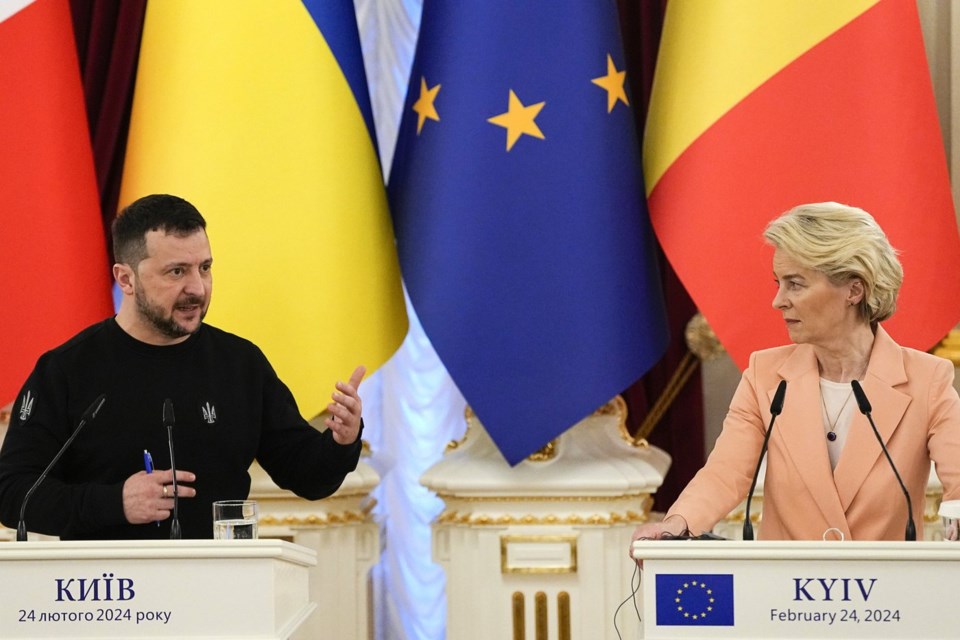BRUSSELS (AP) — The European Union on Tuesday launched membership talks with Ukraine, a decade after Russian troops seized the Crimean Peninsula to deter the country from moving closer to the West, part of a chain of events that set the two neighbors on the path to war.
Ukraine’s accession negotiations were set in motion at an intergovernmental conference in Luxembourg. Just a few hours later, Moldova also launched its membership talks. While the events are a major milestone on their European paths, the talks could take years to conclude.
In opening remarks presented via video-link, Ukrainian Prime Minister Denys Shmyhal described it as “a historic day” that marks “a new chapter” in his country’s ties with the bloc, particularly as the war with Russia rages on.
“We fully understand that there is still much work ahead of us on the path to accession. We are ready for it. We have demonstrated that we can move swiftly and achieve the impossible,” Shmyhal said.
Belgian Foreign Minister Hadja Lahbib, whose country currently holds the EU’s rotating presidency, described it as “a historic moment for us all, and marks a milestone in our relationship.”
Lahbib said the EU condemns “Russia’s unjustified and unprovoked war of aggression against Ukraine and salutes the resilience of the Ukrainian people,” and added that the bloc will continue to support Ukraine in the war “for as long as it takes and as intensely as needed.”
Ukraine's delegation was led in Luxembourg by deputy prime minister for European and Euro-Atlantic integration Olga Stefanishyna. “This is a truly historical moment for my country. All the nation stands as one behind this decision,” she told reporters as she arrived for the ceremony.
Stefanishyna said the hope embodied in the opening of the talks will give Ukraine's citizens “the moral power to continue withstanding” the Russian invasion.
The intergovernmental conferences officially started the process of aligning the countries' laws and standards with those of the 27-nation bloc, which is notably concerned about corruption in both. However, the actual negotiations are unlikely to begin for a few months.
Ukraine and Moldova applied to join the EU in the days and weeks after Russia invaded in February 2022. By June 2022, EU leaders had quickly made it all official. But things have moved more slowly since then for Kyiv and membership, if it comes, might be years away.
Turkey’s accession talks have lasted almost two decades without result.
Still, starting the talks process is sending another strong signal of solidarity with Ukraine beyond the financial support the EU has provided, which officials estimate at around 100 billion euros ($107 billion). It’s also a show of support for Moldova, which has faced its own challenges with Russia.
“It is a historic event for us in historical times for Europe and it signifies the strong commitment of both sides to European peace, security, stability and prosperity," said Prime Minister Dorin Recean. “We will spare no effort to achieve our strategic goal of becoming an EU member.”
Since Russia invaded Ukraine in 2022, neighboring Moldova has faced several crises that have at times raised fears the country might also be in Russia’s crosshairs, from errant missiles landing on its territory, to an energy crisis sparked after Moscow cut gas supplies.
“We are very much affected by the brutal war of Russia in Ukraine, and we are helping each other in the security matters but also in the European accession and we will continue to do so,” Recean told reporters.
Candidate countries must bring their laws and standards into line with those of the EU in 35 policy areas, known as chapters, ranging from the free movement of goods through fisheries, taxation, energy and the environment to judicial rights and security.
Unanimous agreement must be given by all 27 member countries to open or close chapters, providing ample opportunity for EU nations to demand more work or to delay proceedings.
Hungary, which takes over the EU’s rotating presidency from Belgium in July, has routinely put the brakes on EU and NATO support for Ukraine.
“We are still at the beginning of the screening process. It’s very difficult to say at what stage Ukraine is in. From what I see here, as we speak, they are very far from meeting the accession criteria,” Hungarian Minister for European Affairs Janos Boka said as he arrived at the venue.
Bordering EU members Poland, Slovakia, Hungary and Romania, Ukraine would overtake France to become the largest member of the bloc if it joined, shifting its center of gravity further eastward. As a top grain producer its entry would have a huge impact on EU agriculture policy.
Together with Moldova, Ukraine stands in a long line of EU hopefuls — Albania, Bosnia and Herzegovina, Georgia, Montenegro, North Macedonia, Serbia and Turkey — with years-long membership aspirations and which have felt left behind by Kyiv’s rapid progress.
Ukraine wants to join by 2030, but it must carry out dozens of institutional and legal reforms first. That daunting list is led by steps to combat corruption and includes broad reforms to public administration and judiciary.
Lorne Cook, The Associated Press




